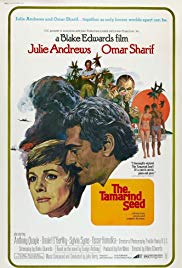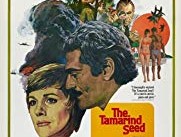The Tamarind Seed *** (1974, Julie Andrews, Omar Sharif, Anthony Quayle, Oskar Homolka, Sylvia Syms, Dan O’Herlihy) – Classic Movie Review 8628
Writer-director Blake Edwards’s enjoyable 1974 movie The Tamarind Seed is a handsome production, with sprightly direction, and the super, pleasing stars convert Evelyn Anthony’s novel into an attractive, appealing romantic, spy thriller movie.
As usual, director Edwards casts his wife Julie Andrews in the star role, this time as Judith Farrow, a top-drawer British widow who meets suave Russian military man Feodor Sverdlov (Omar Sharif). Oddly, Sverdlov (Sharif) then tells his London boss, General Golitsyn (Oskar Homolka), that they should recruit her as a spy. The head of Britain’s spy agency M16, Jack Loder (Anthony Quayle), must act to save the day.
The Tamarind Seed is a polished escapist confection that passes the time most agreeably and pleasantly. Surprisingly, Andrews doesn’t sing, but Wilma Reading sings ‘Play It Again’ by John Barry and Don Black. Barry also writes the excellent score.
The film really belongs to Andrews and Quayle, and to Syms, who was nominated for a BAFTA Film Award as Best Supporting Actress (she lost to Ingrid Bergman in Murder on the Orient Express).
Also in the cast are Sylvia Syms, Dan O’Herlihy, Celia Bannerman, Bryan Marshall, David Baron, Roger Dann, Sharon Duce, George Mikell, Kate O’Mara, Constantin Gregory, John Sullivan, Terence Plummer, Leslie Crawford, Alexei Jawdokimov and Janet Henfrey.
The Tamarind Seed is directed by Blake Edwards, runs 125 minutes, is made by Incorporated Television Company (ITC), Jewel Productions, Pimlico Films and Lorimar Productions, is released by Embassy Pictures (1974) (US) and Scotia-Barber (1974) (UK), is written by Blake Edwards, based on Evelyn Anthony’s novel, is shot in Eastmancolor by Freddie Young, is produced by Sir Lew Grade and Ken Wales, and is scored by John Barry.
It was shot at Shepperton Studios, Middlesex, England, and Pinewood Studios, Iver Heath, Buckinghamshire, England; and on location in Paris, London and Barbados.
It fared well at the box office. Costing $2,400,000, it grossed $8,000,000 in the US, with a cumulative worldwide gross of $13,000,000. Producer Sir Lew Grade said the film ‘did fairly well’ but that he struggled to make much money because Edwards and Andrews took such a large percentage of the profits (Edwards 5% and Andrews 10%).
It was Andrews’s first movie in four years, since her previous spy movie with Edwards, Darling Lili (1970). ‘This is a nice film. It’s just right for my comeback,’ she said. She also starred in Hitchcock’s spy movie Torn Curtain (1966). The spy movie seen playing on the TV in the film is Hitchcock’s Foreign Correspondent (1940).
© Derek Winnert 2019 Classic Movie Review 8628
Check out more reviews on http://derekwinnert.com



